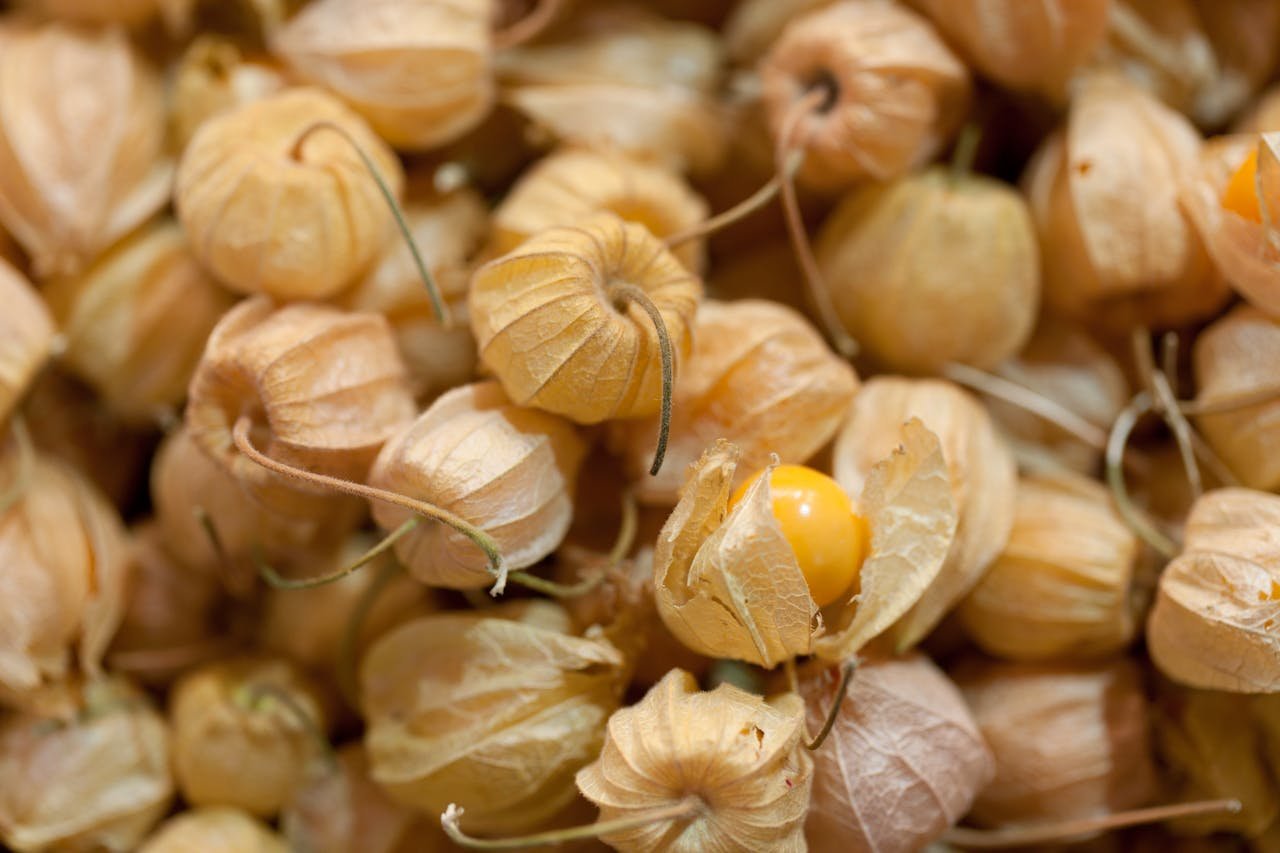Golden Berry
Golden berry, also known as physalis or cape gooseberries, are small round yellow-orange fruit, that are native to South America but are now widely cultivated in many parts of the world. They have a bright yellowish-orange color and are encased in a papery husk. The berries have a unique sweet and tart flavor, similar to a mix of pineapple and tomato.
Golden berries are rich in nutrients and antioxidants, making them a healthy addition to any diet. They are a good source of vitamin C, vitamin A, and dietary fiber. They also contain trace amounts of iron, potassium, and phosphorus.
In addition to their nutritional value, golden berries have several potential health benefits. They may help improve digestion due to their high fiber content. The antioxidants in golden berries can also help protect against oxidative stress and inflammation in the body. Some studies suggest that the bioactive compounds in golden berries may have anticancer, antimicrobial, and anti-inflammatory properties, although more research is needed to confirm these effects.
Golden berries can be enjoyed fresh, dried, or cooked in various dishes. They can be eaten on their own as a snack, added to salads or smoothies, or even used in savory dishes like salsas or chutneys. Dried golden berries are often used in trail mixes or as a topping for yogurt, granola, or desserts.
Although golden berries are generally safe to eat, some individuals may be allergic to them. It is always best to consult with a healthcare professional if you have any concerns or allergies.
Golden berries are also known by these various names
- Cape gooseberry
- Physalis
- Rasbharies
- Poha berry
- Husk cherry
- Pichu berry
- Aztec berry
- Aguaymanto
- Topotopo
- Incan berry
- Ground cherry
- Brazilian raisin
- Peruvian groundcherry.
Types Of Golden Berries
There are several different types of golden berries, each with their own unique characteristics. Some of the popular types include:
1. Physalis Peruviana
This is the most common and widely available type of golden berry. It has a bright yellow-orange color and a sweet and tart flavor.
2. Physalis Pubescens
Also known as Andean ground cherry or hairy goldenberry, this type has small hairs on the surface of the fruit and is slightly smaller than Physalis Peruviana. It has a sweeter taste compared to other varieties.
3. Physalis Angulata
This type of golden berry is native to Brazil and is characterized by its angular and ribbed fruit shape. It has a more-tart flavor compared to other varieties.
4. Physalis Pruinosa
Commonly known as strawberry tomato or hairy ground cherry, this type has a more elongated shape and is covered in fine hairs. It has a slightly sweeter and more mellow flavor.
These are just a few examples of the different types of golden berries available. Each type may have slight variations in taste, texture, and appearance, but all offer similar nutritional benefits and can be used in various culinary applications.
Nutritional Value of Golden Berry
Cape gooseberry also known as golden berries are excellent source of Fiber, Iron, Phosphorus, Potassium, Magnesium, Vitamin C, Thiamin, Riboflavin, Niacin, Vitamin A, Beta, carotene, Lutein, Vitamin K and Vitamin E. They are also cholesterol and sodium free fruits. However golden berries have low levels of fat.
According to USDA Food Composition Data, A 1-cup (140-gram) serving of golden berries contains:
- Calories: 74
- Carbs: 15.7 grams
- Fiber: 6 grams
- Protein: 2.7 grams
- Fat: 1 gram
- Cholesterol: 0 milligrams
- Sodium: 0 milligrams
- Vitamin C: 21% of the RDI for women and 17% for men
- Thiamine: 14% of the RDI for women and 13% for men
- Riboflavin: 5% of the RDI
- Niacin: 28% of the RDI for women and 25% for men
- Vitamin A: 7% of the RDI for women and 6% for men
- Iron: 8% of the RDI for women and 18% for men
- Phosphorus: 8% of the RDI
Nutrition Facts of 100 g Serving Size of raw cape-gooseberries contains:
- Water: 4 (g)
- Energy: 53
- Energy: 222 (kJ)
- Protein: 9 (g)
- Total lipid (fat): 7
- Ash: 8 (g)
- Carbohydrate: 2 (g)
- Calcium, Ca: 9 (mg)
- Iron, Fe: 1 (mg)
- Phosphorus, P: 40 (mg)
- Vitamin C: 11 (mg)
- Thiamin: 11 (mg)
- Riboflavin: 04 (mg)
- Niacin: 8 (mg)
- Vitamin A: 36 RAE (µg)
- Vitamin A: 720 (IU)
Health Benefits of Golden Berry
Golden berry, also known as Physalis fruits, are highly nutritious and offer several health benefits. These are some of the key health benefits of golden berries:
1. High in antioxidants
Golden berries are rich in powerful antioxidants such as carotenoids, polyphenols, and vitamin C. These powerful antioxidants help protect your body against free radicals that damage cells and tissues, thus reducing the risk of chronic diseases, such as heart disease, and certain types of cancer. The phytosterols antioxidant in golden berries is good at lowering low-density lipoprotein (LDL) cholesterol, better known as “bad” cholesterol.
2. Boost immune system
Golden berries contain high levels of vitamin C, which is essential for a strong immune system. Golden berries are a excellent source of vitamin C. One cup (140 grams) of golden berries can provide you with 15.4 mg of vitamin C, which is 21% of the RDI for women and 17% for men.
Vitamin C plays several key roles in a healthy immune system response. It stimulates the production of white blood cells, which help fight off infections and illnesses. Golden berries contain various polyphenols which can block the release of certain inflammatory immune markers.
3. Support eye health
Golden berries are rich source of carotenoids, such as beta-carotene and zeaxanthin, which are beneficial for your eye health. A diet high in carotenoids compounds are linked to protect the eyes from oxidative stress and lower the risk of cataracts and age-related macular degeneration, which is the leading cause of blindness. The high levels of carotenoid lutein, zeaxanthin, and lycopene in golden berry can help to prevent eye diseases and protect against vision loss from diabetes.
4. Aid digestion
Golden berries are a good source of dietary fiber, which promotes a healthy digestive system. Fiber helps regulate bowel movements, prevents constipation, and supports gut health by feeding beneficial gut bacteria.
5. Anti-inflammatory properties
Antioxidants is known for reducing inflammation that can cause arthritis, gout, muscle aches, bowel disease, chronic pain, or even hemorrhoids. Golden berries contain several of these antioxidant’s compounds, such as polyphenols and withanolides (which is a natural plant steroid), that might help fight inflammation, or the body’s natural response to an injury or irritant.
These polyphenols and withanolides can help to reduce inflammation in the body, which may help alleviate symptoms of inflammatory conditions, such as chronic arthritis, autoimmune diseases, and some neurodegenerative diseases. As too much inflammation is associated with these chronic conditions. Inflammation of arteries and blood vessels are dangerous for the cardiovascular system.
The anti-inflammatory properties of goldenberries can improve heart health by reducing strains and preventing the development of atherosclerosis and coronary heart disease. They can also effectively lower blood pressure, thereby decreasing the symptoms of hypertension.
6. Support heart health
Golden berries are low in calories and rich in heart-healthy nutrients like potassium and fiber. Potassium helps regulate blood pressure, while fiber can help lower cholesterol levels, reducing the risk of heart disease.
The anti-inflammatory properties of golden berries can improve your heart health by purifying your blood, reducing strain and preventing the development of atherosclerosis and coronary heart disease.
Due to the presence of polyphenols and carotenoids, cape golden berries can effectively regulate and lower high blood pressure levels, thereby decreasing the symptoms of hypertension.
7. Aid in weight management
Golden berries are a nutrient-dense fruit that can be a healthy addition to a weight loss or weight management plan. Golden berries are high in fiber, helping to promote feelings of fullness and reduce calorie intake.
Low in fat and calories with only 53 calories per 100 grams, a handful of golden berries can make for a great snack or a meal filler to support your weight loss goals. as such you can easily add them to your favorite diets such as oatmeal, yogurt, and other healthy snacks, or eat them raw.
8. Reduce cholesterol levels
Golden berries contain phytosterols antioxidant that can help lower the cholesterol levels in the blood, especially the “bad” (LDL) cholesterol. Cape gooseberries also contain fatty acids like linoleic acid and oleic acid, which can also help to lower cholesterol levels.
9. Fight cancer
Golden berries contain vitamins A, E, B complex and C, which are antioxidants. The anti-oxidants properties of these nutrients can protect cells from damaging effects of free radicals, that might contribute to cancer.
Consuming golden berries can prevent the growth of lung cancer, breast cancer, and oral cancer cells. Golden berries contain a compound called withanolides, which have anti-inflammatory effects in protecting against colon cancer.
Golden berries have also been proven to combat prostate cancer, a common disease among mature and older men. Regular consumption of the fresh golden berry may help to fight prostate cancer.
10. Bone Health
Golden berries are rich in vitamin K and iron, which is involved in bone metabolism. Vitamin K is a necessary component of bone and cartilage, which plays an important role in the development of healthy bone turnover rates. Vitamin K should be taken alongside with vitamin D to achieve an optimal bone health.
Golden berries are high in calcium and phosphorous, which can help in making your bones stronger. It also contains pectin that helps in calcium and phosphorus absorption, thereby, making your bones stronger. It also manages conditions like rheumatism and dermatitis
11. Rich in vitamins
Goldenberries are rich in vitamins A, B1, B2, B3, E, C and K. These vitamins help support a healthy immune system and protect the body against oxidative stress caused by free radicals.
12. Diabetes management
The anti-oxidants properties of golden berries can slow the breakdown and intake of simple sugars from carbohydrates. Regular consumption of the golden berries reduces blood sugar levels, which is the leading cause of diabetes. Goldenberry are effective in the treatment for type 2 diabetes.
It’s important to note that while golden berries offer numerous health benefits, you should eat them as part of a balanced diet and not as a sole solution for any specific health condition.
Uses of Golden Berries
Golden berries have several uses and can be incorporated into various dishes and preparations. Here are some common uses of golden berries:
1. Culinary uses
Golden berries can be eaten fresh as a snack or included in a variety of culinary creations. They have a tangy and slightly sweet flavor that complements both sweet and savory dishes. Golden berries can be added to fruit salads, smoothies, yogurt bowls, and desserts like pies, tarts, and jams.
2. Dried golden berries
Golden berries can be dried and enjoyed as a convenient, portable snack. Dried golden berries have a chewy texture and their flavor becomes slightly sweeter.
3. Baking ingredient
Golden berries can be used as an ingredient in baking. They can be added to cookies, muffins, bread, cakes, and granola bars to add a unique flavor and texture.
4. Sauce or chutney
Golden berries can be used to make delicious sauces or chutneys. They can be cooked down with other ingredients such as onions, garlic, vinegar, and spices to create a tangy and sweet condiment that pairs well with meats, roasted vegetables, and cheeses.
5. Toppings
Golden berries are use for topping for salads, oatmeal, cereals, or pancakes. They add a burst of flavor and a colorful touch to the dishes.
6. Infusions
You can be use golden berries to infuse water, tea, or alcoholic beverages like vodka or rum. Adding golden berries to these beverages can impart a unique flavor and add a visual appeal.
7. Traditional medicine
In some traditional herbal medicine practices, golden berries have been used to treat certain ailments such as urinary tract infections, rheumatism, and inflammation. However, further scientific research is needed to validate these uses.
It’s important to note that while golden berries are generally safe for consumption, some individuals may be allergic or sensitive to them. It’s always recommended to consume golden berries in moderation and consult a healthcare professional if you have any concerns or pre-existing conditions.
How To Eat Golden Berries
Golden berries can be eaten in a variety of sweet and savory dishes. To find your favorite new dish, you can try some of these golden berry recipes:
1. Fresh
Simply remove the papery husk and eat the golden berry as a fresh snack. They have a tangy flavor that is both sweet and sour and can be enjoyed on their own.
2. Dried
Golden berries can be dried, which gives them a chewy texture and intensifies the sweetness. Dried golden berries make a convenient and healthy snack.
3. Add to fruit salads
Golden berries can be a flavorful addition to fruit salads. Just toss them in with other fruits like berries, melons, and citrus for a tangy twist.
4. Smoothies
Golden berries can be blended into smoothies for added flavor and nutritional benefits. They pair well with other fruits like bananas, mangoes, and pineapples.
5. Yogurt bowls
Sprinkle golden berries onto your yogurt bowl for a burst of tangy sweetness. It adds texture and color to your bowl.
6. Baking
You can add golden berries to various baking recipes. Incorporate them into cookies, muffins, bread, cakes, or granola bars for a unique flavor and texture.
7. Sauces or chutneys
Cook golden berries down with other ingredients like onions, garlic, vinegar, and spices to create a tangy and sweet sauce or chutney. Use it as a condiment to enhance the flavors of meats, roasted vegetables, or cheeses.
8. Toppings
Add golden berries as a topping to your salads, oatmeal, cereals, or pancakes. They will give a colorful touch and introduce a burst of flavor.
Remember to wash golden berries before consuming them, just like you would with any other fruit. Enjoy them in moderation and have fun experimenting with different recipes and combinations.
Potential Side Effects of Golden Berries
Golden berries, also known as Physalis peruviana, are a small yellow-orange fruit that has been gaining popularity in recent years due to its reported health benefits. While this fruit may offer some nutritional benefits, it is important to be aware of potential side effects that may come with consuming golden berries.
Golden berries are a member of the nightshade family, which includes tomatoes and eggplant. They naturally contain solanine, a compound that can be toxic in high amounts. Golden berries may be poisonous if you eat them unripe.
When eating golden berries, make sure that, they are fully ripe and don’t have any green coloration. This is because, unripe golden berries contain solanine compound, that can be toxic to humans, which can lead to digestive discomfort, arthritis flare-ups, diarrhea, vomiting, and an irregular heartbeat.
1. Allergic reactions
As with any food, there is a possibility of developing an allergic reaction to golden berries. According to research, it is possible for individuals to experience symptoms such as itching, hives, swelling, and difficulty breathing after consuming golden berries. If you have allergy to other fruits in the same family, such as tomatoes or bell peppers, it is best to exercise caution when consuming golden berries.
2. Gastrointestinal issues
Eating too many golden berries may cause gastrointestinal issues such as bloating, gas, and diarrhea. This is because golden berries contain a high amount of soluble fiber, which can be difficult for some individuals to digest. It is always best to start with a small serving size when trying new foods and to listen to your body’s response.
3. Interactions with medications
Golden berries have potential interactions with certain medications. For example, they contain high levels of vitamin K, which can interfere with blood thinners such as warfarin. If you are taking any medications, it is important to consult with your healthcare provider before adding golden berries to your diet.
4. Dental issues
Golden berries are high in natural sugars, which can be harmful to teeth if consumed in excess. The sticky texture of golden berries can also contribute to tooth decay and cavities. It is best to rinse your mouth with water after eating golden berries and to practice good oral hygiene habits.
5. Oxalate content
Golden berries contain oxalates, a natural compound found in many plants. For individuals with a history of kidney stones, high levels of oxalates in the diet may increase the risk of developing new stones or aggravating existing ones. It is important to moderate your intake of oxalate-containing fruits like golden berries and to drink plenty of water to prevent kidney stone formation.
In conclusion, while golden berries offer potential health benefits, it is important to be mindful of potential side effects. As with any food, moderation is key. If you experience any adverse reactions after consuming golden berries, it is best to stop consumption and consult with a healthcare professional. It is also important to note that these side effects are based on individual reactions and may vary from person to person.
Reference
- Ben’s Natural Health Team. January 4, (2023). Golden Berries: Nutrition and Benefits. https://www.bensnaturalhealth.com/blog/general-health/golden-berries-benefits/
- Brinkley, L., and Greenberg, A. “Dietary composition and kidney stone formation: a review.” American journal of clinical nutrition 90.3 (2009): 725-732.
- Candace Nelson and Patricia Pinto-Garcia. February 23, (2023). 3 Potential Health Benefits of Golden Berries and How to Add Them to Your Diet. https://www.goodrx.com/well-being/diet-nutrition/golden-berries
- Cleveland Clinic. October 22, (2021). Are Golden Berries Good for Your Health? https://health.clevelandclinic.org/golden-berries/
- John Staughton and Zemira Barnes. June 16, (2021). 8 Wonderful Benefits of Golden Berries. https://www.organicfacts.net/health-benefits/fruit/golden-berries.html.
- Melissa Groves. July 17, (2023). What Are Golden Berries? Everything You Need to Know. https://www.healthline.com/nutrition/golden-berries.
- National Institutes of Health. “Physalis peruviana.” Drugs and Lactation Database (LactMed) [Internet]. Bethesda (MD): National Library of Medicine (US); 2006. Available from: https://www.ncbi.nlm.nih.gov/books/NBK557774/
- Salazar-Agudo, Lorena, et al. “Fructooligosaccharides in golden berries (Physalis peruviana L.) protect against chronic constipation and associated colon cancer in Wistar rats.” Food and Chemical Toxicology 128 (2019): 85-94.
- Sravani Chintapalli and Pallavi Suyog Uttekar. June 30th (2022). Golden Berries: Nutrition, Benefits, and How to Eat Them. https://www.medicinenet.com/golden_berries_nutrition_benefits_how_to_eat/article.htm
- Sushmita Sengupta July 20, (2019). Marvelous Health Benefits of Cape Gooseberries (Rasbharies). https://food.ndtv.com/food-drinks/9-marvelous-health-benefits-of-cape-gooseberries-rasbharies-1670679.
- Sussman, Gordon, and Allen. “Golden berry: a source of allergenicity.” Annals of Allergy, Asthma & Immunology 64.6 (1990): 501-502.
- WebMD Editorial Contributors and Dany Paul Baby. September 19, (2022). Health Benefits of Golden Berry. https://www.webmd.com/diet/health-benefits-golden-berry.






Pingback: Berries: Types, Health Benefits, and Its Potential Side Effects
Pingback: Acai Berries: Types, Nutrition, Benefits, Side Effects, and More